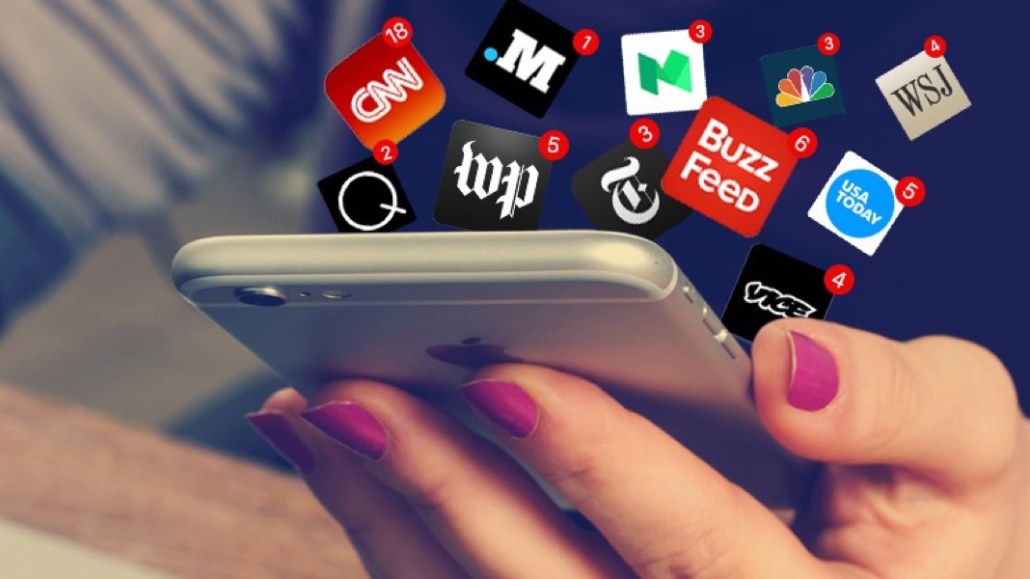Save 50% on a 3-month Digiday+ membership. Ends Dec 5.
Marketers look to reap benefits of Apple’s new push notification ad rules

Apple updated its App Store guidelines earlier this month to allow app publishers to send ads and promotions in push notifications to users who have explicitly opted in to receive them. First reported by tech blog 9to5Mac, the new guidelines also state that developers need to provide users the ability to opt-out from receiving marketing notifications. Previously, developers were prohibited from sending push notifications containing marketing messages.
While the strict nature of Apple’s wider privacy-focused policies will probably prevent push notifications from becoming a massive new revenue stream for app owners, mobile marketing experts were hopeful the changes could help improve user loyalty within apps. They also warned that a sharp uptick in notifications will quickly result in users reaching for the uninstall button.
Push notifications have higher open rates than email, but until now push notifications have largely represented an “unexploited opportunity for consumer engagement” between brand owners and consumers, said Rafe Blandford, chief product officer at Digitas UK. The policy change “will allow a more direct link to revenue driving journeys, so I would expect it to increase app-linked revenue for apps that have transactional elements,” he added.
Still, app owners should beware “death by notification,” said Gillian Bell, director of digital services at marketing communications agency Wake The Bear. “It has to be benefit-led versus, ‘We have inventory to sell and we need to push more product’ … in the app environment people are less forgiving — make too many mistakes and, boom, you’re gone.”
Apple did not respond to a request for comment.
Carl Uminski, CEO of digital agency Somo, said app owners, particularly in segments like freemium gaming, may continue to test the boundaries of Apple’s rules and try to use the policy change to create short-term revenue opportunities — by selling notification placements to advertisers, or to promote virtual goods for sale, for example. (Apple’s updated App Store Review Guidelines state that “monetizing built-in capabilities provided by the hardware or operating system, such as push notifications” are an “unacceptable” use case.)
Mobile marketing experts raised questions as to how closely Apple would police the new policy. Under the previous App Store guidelines, Apple prohibited developers from inserting “advertising, promotion, or direct marketing” into their notifications, yet experts told Digiday they frequently received notifications from apps that appear to be promotional. “I get the Domino’s popup so often that I’ve become numb to it,” said Stuart Austin, audience and data consultant at concert search engine company Live Nation. “I didn’t realize it has basically been an ad the entire time.”
Ad position: web_incontent_pos1
Apple has also previously sent its own push notifications to promote Apple TV show “Carpool Karaoke” and an Apple Music trial, as The Verge reported.
Ultimately, app owners will need to closely manage and test the frequency of the notifications they send to avoid consumers becoming disengaged and opting out.
“If a consumer wants to know when a retail app is having a sale, then push notifications are probably the most optimal way of receiving this information,” said Chris Day, chief product officer of mobile advertising agency Mobkoi. “However, notifications are also easily abused; they can become disruptive, unwelcome and ultimately less useful when sent in large quantities.”
Apple’s requirement for explicit user opt-in and its classification of marketing push notifications as a “privilege” that can be revoked should help mitigate this kind of abuse, he added.
More in Marketing

Ulta, Best Buy and Adidas dominate AI holiday shopping mentions
The brands that are seeing the biggest boost from this shift in consumer behavior are some of the biggest retailers.

U.K. retailer Boots leads brand efforts to invest in ad creative’s data layer
For media dollars to make an impact, brands need ad creative that actually hits. More CMOs are investing in pre- and post-flight measurement.
Ad position: web_bfu
